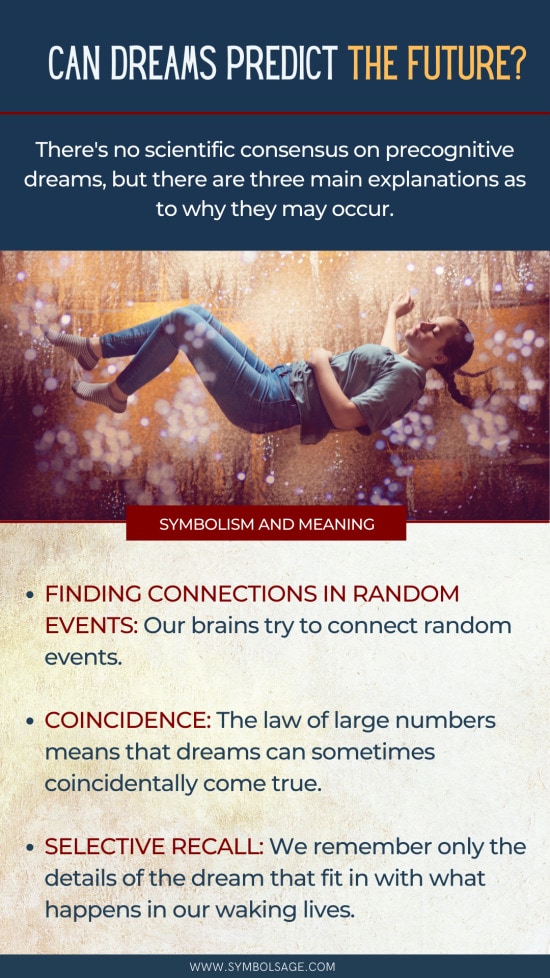
Table of Contents
Since ancient times, some dreams have been thought to predict the future. These are known as precognitive dreams.
The Ancient Egyptians had elaborate books for dream interpretation, and the Babylonians slept in temples, hoping that their dreams would give them advice on important decisions. The ancient Greeks also slept in temples of Asclepius to receive health instruction in their dreams, while the Romans did the same in shrines of Serapis.
In the 2nd century CE, Artemidorus wrote a book about the interpretations of dream symbols. In medieval Europe, political matters were decided on the basis of dreams. In our modern times, some people still believe that dreams give insight about future events.
Is there any truth to this? Can dreams predict the future? Here’s a closer investigation into precognitive dreams, and the possible reasons behind them.

Are Precognitive Dreams Real?
In his book A Critical Investigation into Precognitive Dreams: Dreamscaping without My Timekeeper, doctoral graduate in Clinical Psychology and certified hypnotherapist, Paul Kiritsis states:
“The precognitive dream is a compelling, real-world phenomenon that still stands outside the purview of orthodox science. It is spoken about anecdotally and has been alluded to time and time again by renowned psychiatrists, psychologists, neurologists, and other clinicians expounding upon the nature of their patients’ narratives. However, it receives no empirical airtime because it is incommensurable with conventional explanations of human consciousness…”.
Precognitive dreams are much more common than you might think. Studies have shown that almost half the population experiences some form of precognitive dream at some point in their lives.
In Psychology Today, psychologist Patrick McNamara writes that precognitive dreams do occur. McNamara argues that due to how common and frequent such dreams are, it’s important that scientists discuss why and how these dreams take place, rather than denying that they do. While there’s no scientific consensus on precognitive dreams, there are several explanations as to why these dreams may occur.
What Could Be Behind Precognitive Dreams?
Experts give various explanations about precognitive dreams. In general, these dreams that seem to predict the future are likely caused by our ability to find association between random events, just plain coincidence, or selectively recalling the dream.
Finding Connections in Random Events
As humans, we tend to look for patterns or associations to make sense of our world and what’s happening around us. The creative thinking process draws on our ability to form associations among random elements and combine these different elements to create something meaningful or useful. This tendency can extend to dreams as well.
People who have strong belief in psychic or paranormal experiences and precognitive dreams tend to make more associations between unrelated events. In addition, your mind can make connections you’re not aware of, which can also manifest in dreams.
Coincidence
It’s said that the more dreams you remember, the better the chances that you will perceive something as precognitive. This is the law of large numbers.
Every person is bound to dream a large number of dreams about different things, and it’s just natural that some of them would align with something in your life. They say even a broken clock is right twice a day.
In the same way, every now and then, dreams can coincide with what’s about to happen in your waking life, making it appear as though the dream was foretelling what was to be.
Bad Memory or Selective Recall
When bad things happen around you, it’s likely you’ll have dreams that reflect the situation. According to research, memories associated with fearful experiences are more easily remembered than memories associated with non-fearful experiences. It explains why reports of having precognitive dreams become more common in times of crisis such as war and pandemic.
In another study conducted in 2014, participants tended to remember dreams that appear to parallel with an event occurring in their life. In other words, they memory of their dreams were selective, as they focused on the aspects of the dream that came true in their waking life, rather than on the aspects of the dream that didn’t. So, while it might appear that the dream had come true, some of the details of the dream just don’t fit in with waking reality.
Famous Examples of Precognitive Dreams
While science hasn’t found evidence to support the idea of precognitive dreams, some people still claimed to have experienced dreaming about events that later happened.
Abraham Lincoln’s Assassination
The 16th president of the United States, Abraham Lincoln had a dream of his own death in 1865. Ten days before being assassinated, he dreamed about seeing a covered corpse lying on a catafalque in the White House East Room, surrounded by a crowd of mourners. In his dream, it appeared that the dead person in the White House was the president who was killed by an assassin.
It’s even said that Lincoln told his friend Ward Hill Lamon that the eerie dream had strangely annoyed him ever since. On the evening of April 14, 1865, he was assassinated by Confederate sympathizer John Wilkes Booth at Ford’s Theatre in Washington, D.C. The assassin jumped onto the stage and shouted, “Sic semper tyrannis!” The motto translates as, “Thus ever to tyrants!”
However, some historians have doubted the story shared by Lincoln’s friend Ward Hill Lamon, as it was first published almost 20 years after the president’s assassination. It’s said that he and Lincoln’s wife Mary didn’t mention the dream right after the event. Many speculate that the president had interest in the meaning of dreams, but there’s no evidence that he foresaw his own death.
The Aberfan Disaster
In 1966, a landslide occurred in Aberfan, Wales due to the coal waste from nearby mining operations. It’s regarded as one of the United Kingdom’s worst mining disasters, as the landslide hit the village school and killed many people, mostly children sitting in their classrooms.
Psychiatrist John Barker visited the town and on speaking with the residents, discovered that many people had had precognitive dreams before the disaster. According to anecdotal evidence, even some of the children had talked about dreams and premonitions they had had about dying many days before the landslide occurred.
Prophetic Dreams in the Bible
Many of the dreams recorded in the Bible were prophetic, as they foretold future events. Most of these dreams consisted of symbolism which were revealed in the texts and confirmed by future events. They’re often cited by some people as indication that dreams give prophecy, warnings, and instructions.
Egypt’s Seven Years of Famine
In the book of Genesis, an Egyptian pharaoh had a dream of seven fat cows being eaten by seven thin cows. In another dream, he saw seven full heads of grain growing on one stalk, swallowed up by seven thin heads of grain.
Ascribing the interpretation to God, Joseph explained that the two dreams meant that Egypt would have seven years of abundance to be followed by seven years of famine. So, he advised the pharaoh to store grain during the years of abundance.
Famines in Egypt rarely last long, but the country depended on the Nile River for agriculture. On the island of Elephantine, a tablet has been found commemorating the period of seven years the Nile failed to rise, which resulted in famine. This can be traced back to the time of Joseph.
Babylonian King Nebuchadnezzar’s Madness
King Nebuchadnezzar had a prophetic dream that predicted his downfall from his throne, as well as his fall into madness and recovery. In his dream, there was a great tree that grew up and its height reached the heavens. Unfortunately, it was cut down and banded seven times before being allowed to grow again.
In the book of Daniel, the great tree is said to symbolize Nebuchadnezzar who became great and strong as the ruler of a world power. Eventually, he was cut down by mental illness, where for seven years he lived in the fields and ate grass like bulls.
In the historical work Antiquities of the Jews, seven times is interpreted as seven years. At the end of his days, Nebuchadnezzar came back to his senses and regained his throne. The Babylonian document Ludlul Bel Nëmeqi, or the Babylonian Job, describes a similar story of the king’s madness and restoration.
Nebuchadnezzar’s Dream on World Powers
In the second year of Nebuchadnezzar’s reign in 606 BCE, he had a terrifying dream about the succession of kingdoms that would follow after the Babylonian Empire. The dream was interpreted by the prophet Daniel. In the book of Daniel, the dream describes a metallic figure with a gold head, silver breast and arms, copper belly and thighs, iron legs, and feet of iron mixed with moist clay.
The gold head symbolized the Babylonian line of rulership, as Nebuchadnezzar headed a dynasty that ruled the Babylon. By 539 BCE, Medo-Persia conquered Babylon and became the dominant world power. Therefore, the silver part of the figure symbolized the line of Persian kings beginning with Cyrus the Great.
In 331 BCE, Alexander the Great conquered Persia, and established Greece as the new world power. When Alexander died, his empire was divided into territories ruled by his generals. The copper-like world power of Greece continued until 30 BCE, when the Ptolemaic dynasty ruling in Egypt fell to Rome. Stronger than previous empires, the Roman Empire had iron-like power.
However, the iron legs in the dream figure represented not only the Roman Empire, but also its political outgrowth. Britain was once part of the empire, and Anglo-American world power came into being during World War I. In the book of Daniel, the feet of iron and clay symbolize the politically divided world of the present time.
In Brief
The interest in precognitive dreams stems from people’s desire for sound guidance in their lives. While there’s no way to determine why some dreams appear to come true, it’s likely that people with stronger belief in psychic experiences tend to interpret their dreams as precognitive.
While science has attempted to answer the role that precognitive dreams may play in our lives, there’s still no consensus on the meaning of these dreams.








